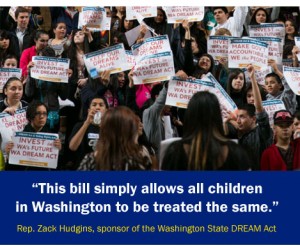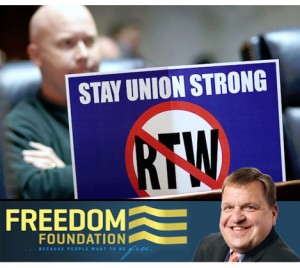NEWS ROUNDUP
Why vote in 2014, health care deal, Sequim ruling…
Wednesday, September 24, 2014
ELECTION
 ► At In These Times — Why vote in 2014 — In Ferguson, Missouri, a town where 67 percent of residents are black and 29 percent white, five of the six city council members are white, as is the mayor. This white-dominated city government employs a police force in which 94 percent of the officers are white (50 out of 53). How did this happen? In Ferguson’s 2013 municipal elections, 6% of black registered voters cast ballots, compared with 17% of whites.
► At In These Times — Why vote in 2014 — In Ferguson, Missouri, a town where 67 percent of residents are black and 29 percent white, five of the six city council members are white, as is the mayor. This white-dominated city government employs a police force in which 94 percent of the officers are white (50 out of 53). How did this happen? In Ferguson’s 2013 municipal elections, 6% of black registered voters cast ballots, compared with 17% of whites.
On a national scale, a similar electoral scenario has played out, with similarly unfortunate results. In 2010, key progressive voting blocs — young people, single women, African Americans and Latinos — were underrepresented at the polls. Their alienation is understandable. People need a reason to think their vote matters. But the under-participation of these contingents has been disastrous. In 2010, voters elected union-busting Republican governors and legislatures in Wisconsin, Michigan, Ohio, Pennsylvania, Florida and North Carolina — six swing states that went for Obama in 2008 and 2012 (the one exception being North Carolina in 2012). Should this 2010 midterm trend repeat itself in 2014, the consequences could be even more dire.
EDITOR’S NOTE — So… make sure you VOTE! And also, help to get out the vote. Click here for the schedule of upcoming Labor’s Voice neighborhood walks and phone banks, and volunteer!
STATE GOVERNMENT
► At WFSE.org — State employee health care agreement reached — The Washington Federation of State Employees-led Health Care Coalition of all state employee unions has reached tentative agreement with the state on the 2015-2017 Health Care Benefits agreement that to virtually preserving status quo on health premiums, and UMP point-of-service costs.
► In today’s Olympian — Agreement reached that keeps state worker share of health premium at 15% — The Washington Federation of State Employees announced the tentative agreement between the governor’s labor negotiators and more than two-dozen labor unions, say it largely preserves the “status quo.”
 ► From KPLU — New generation of undocumented students starts college on state Dream Act — A year ago, it wasn’t even clear if Carlos Escutia, a Lynnwood High School grad, would make it to move-in day at the University of Washington. Then the state legislature passed the “Dream Act,” granting many undocumented high school graduates access to state-funded college grants. Escutia was among the first to apply, and he is now part of the state’s first wave of so-called “dreamers” to start classes.
► From KPLU — New generation of undocumented students starts college on state Dream Act — A year ago, it wasn’t even clear if Carlos Escutia, a Lynnwood High School grad, would make it to move-in day at the University of Washington. Then the state legislature passed the “Dream Act,” granting many undocumented high school graduates access to state-funded college grants. Escutia was among the first to apply, and he is now part of the state’s first wave of so-called “dreamers” to start classes.
► In today’s Olympian — Dishonest contractors cheat their workers (editorial) — A year-long, multi-state investigation by McClatchy Newspapers uncovered massive fraud within the construction industry in 28 states. By reviewing public records, the investigation found that dishonest employers listed their workers as independent contractors, rather than employees. That simple, but illegal act cheated the government out of billions of dollars and made its unsuspecting workers liable for tax payments and deprived them of on-the-job medical coverage. No government should be doing business with such unscrupulous employers.
LOCAL
 ► In today’s Peninsula Daily News — Sequim labor initiatives will miss November ballot as judge orders trial for lawsuit — Two proposed initiatives aimed at changing Sequim’s dealings with unions representing city employees will not be on the ballot come November. Clallam County Superior Court Judge Erik Rohrer ruled Tuesday morning that “genuine issues of material fact” need to be “resolved at trial” as he denied a lawsuit asking him to order the initiatives be on the Nov. 4 general election ballot.
► In today’s Peninsula Daily News — Sequim labor initiatives will miss November ballot as judge orders trial for lawsuit — Two proposed initiatives aimed at changing Sequim’s dealings with unions representing city employees will not be on the ballot come November. Clallam County Superior Court Judge Erik Rohrer ruled Tuesday morning that “genuine issues of material fact” need to be “resolved at trial” as he denied a lawsuit asking him to order the initiatives be on the Nov. 4 general election ballot.
EDITOR’S NOTE — And so, the legal bills will continue to mount for the cities targeted by the right-wing extremists at the Freedom Foundation, which brags that litigation is an important part of their strategy to “defund labor’s political machine.” For more information, read The Stand’s report: Cities reject extremist group’s push for ‘right-to-work’ (Sept. 9)
► MUST-READ in today’s Seattle Times — Surrounded by a feeling of poverty amid signs of prosperity (by Danny Westneat) — The idea that we have become a poor country seems ridiculous. Unless you read the news as an outsider might. Crumbling roads and bridges. Insufficient funds for medical care for veterans. Cuts in unemployment benefits. Poverty-level minimum wages. On the local level, despite all those cranes, it’s arguably worse. Lawmakers held in contempt for underfunding public schools. Colleges slashed again. Mental-health services deteriorating. Too few police. Buses overwhelmed. “Are we a poor country?” It’s a great question. Technically, we are hardly a poor country. But we are acting like one.
► In today’s Seattle Times — Light-rail tunnel partnership sued by black laborers — Eight laborers have signed onto a lawsuit filed against the companies that contracted to handle Sound Transit’s Capitol Hill Tunnel project, saying they were given menial jobs and dismissed after less than a month because they are black.
► In today’s Tri-City Herald — DOE report questions productivity at Hanford Plutonium Finishing Plant — A lack of productivity at Hanford’s Plutonium Finishing Plant has contributed to putting work there two years behind and $179 million over earlier cost and schedule projections, according to a new report.
FEDERAL GOVERNMENT
► In the New Republic — The GOP’s new ‘jobs bill’ will create few jobs, but plenty of debt — Last Thursday, House Republicans passed a “jobs” bill that includes a smorgasbord of traditional conservative ideas. But it would also increase the deficit by $590 billion over the next 10 years, according to the Committee for a Responsible Federal Budget. And these aren’t temporary costs, like the stimulus (which wasn’t that much larger, money-wise than this new GOP “jobs” plan anyways). After the first decade, the costs will only increase.
 ► In today’s NY Times — Americans are OK with big business. It’s business lobbying power they hate. — Asked, “Is it a good thing or bad thing for corporations to be strong and influential?” Only 31 percent of Americans answered that it is a good thing, among the lowest of the countries surveyed and far below the 60 and 70 percent levels in some emerging countries. Similarly, Americans are more likely than respondents in any country surveyed except Italy to believe that corporate lobbyists exercise a high degree of influence over the national government.
► In today’s NY Times — Americans are OK with big business. It’s business lobbying power they hate. — Asked, “Is it a good thing or bad thing for corporations to be strong and influential?” Only 31 percent of Americans answered that it is a good thing, among the lowest of the countries surveyed and far below the 60 and 70 percent levels in some emerging countries. Similarly, Americans are more likely than respondents in any country surveyed except Italy to believe that corporate lobbyists exercise a high degree of influence over the national government.
► In today’s NY Times — Cracking down on corporate tax games (editorial) — New rules from the Treasury Department should slow the practice of American companies avoiding taxes by merging with foreign rivals. Now Congress should act.
EDITOR’S NOTE — Let’s all start holding our breath…. now.
NATIONAL
► In today’s LA Times — L.A. Council to vote on $15.37 minimum wage for workers at big hotels — The drive to boost minimum wages in Los Angeles could reach a milestone this week as the City Council votes on a proposal to raise the hourly pay of thousands of workers at big hotels to at least $15.37. That would be more than $2 an hour higher than the minimum wage Mayor Eric Garcetti is advocating for workers citywide.
► In today’s NY times — Under ACA, 25% increase in health insurers is predicted — Consumers in much of the country will have a broader selection of health insurance plans next year, the Obama administration said Tuesday, as it predicted an increase of about 25 percent in the number of insurers that are expected to compete in federal and state marketplaces.
TODAY’S MUST-READ
 ► In today’s NY Times — A health care success story (by Bob Kocher and Farzad Mostashari) — It may have been the most influential magazine article of the past decade. In June of 2009, the doctor and writer Atul Gawande published a piece in The New Yorker called “The Cost Conundrum,” which examined why the small border city of McAllen, Tex., was the most expensive place for health care in the United States. The article became mandatory reading in the White House. President Obama convened an Oval Office meeting to discuss its key finding that the high cost of health care in the country was directly tied to a system that rewarded the overuse of care. The president also brought up the article at a meeting with Democratic senators, emphasizing that McAllen represented the problem that needed to be fixed. Five years later, the situation has changed. Where McAllen once illustrated the problem of American health care, the city is now showing us how the problem can be solved, largely because of the Affordable Care Act that Obama signed into law in 2010.
► In today’s NY Times — A health care success story (by Bob Kocher and Farzad Mostashari) — It may have been the most influential magazine article of the past decade. In June of 2009, the doctor and writer Atul Gawande published a piece in The New Yorker called “The Cost Conundrum,” which examined why the small border city of McAllen, Tex., was the most expensive place for health care in the United States. The article became mandatory reading in the White House. President Obama convened an Oval Office meeting to discuss its key finding that the high cost of health care in the country was directly tied to a system that rewarded the overuse of care. The president also brought up the article at a meeting with Democratic senators, emphasizing that McAllen represented the problem that needed to be fixed. Five years later, the situation has changed. Where McAllen once illustrated the problem of American health care, the city is now showing us how the problem can be solved, largely because of the Affordable Care Act that Obama signed into law in 2010.
The Stand posts links to Washington state and national news of interest every weekday morning by 10 a.m.





